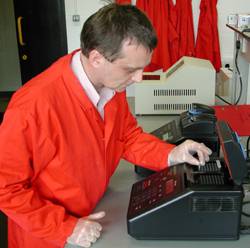| 2003 |

|
YEAR BOOK |
State Laboratory
|
Detection of Genetically Modified Organisms (GMOs)
|

Monitoring for the presence of GMO involves screening samples for the artificial promoter or terminator sequences (the 'ON' and 'OFF' switches) associated with inserted genetic elements. These are detected by the Polymerase Chain Reaction (PCR), which produces multiple copies of the target DNA (deoxyribonucleic acid) of interest. The GMO must then be characterised by specific tests and the amount of GMO present must be determined. In the case of processed foods, a fluorescent based 'Real-Time' PCR technique is used for quantitation. A probability based approach, involving qualitative PCR and multiple sub-samples, is used to determine percentage GMO in seed.
The reliable detection, characterisation and quantification of GMO requires extensive validation of test methods involved. Estimates for the Limit of Detection and Quantitation for all the tests must be determined. The robustness and reproducibility of methods, areas of measurement variation, and the effects of diverse sample matrices on the test methods must be examined to achieve the most accurate, precise results. Ongoing quality is evaluated by participation in external proficiency testing schemes, where samples are analysed, quantified and the results independently assessed. With the rapidly changing number of modifications and the possibility of multiple GMOs in a sample, the availability of suitable tests and controls becomes an issue, as GMO may be present but not identified if suitable control material and/or tests are not available.
The State Laboratory, as part of its Quality System, is committed to such a validation process. In addition, the State Laboratory is both a member, and on the Steering Committee, of the European Network of GMO Laboratories. Formally launched in December 2002, the main objectives of the ENGL are to contribute to the harmonisation and standardisation of methods of sampling, detection and quantitation of GMOs, enabling the highest standards of testing to be maintained and facilitating member states to fulfil their responsibilities in health and consumer protection with regard to GMO.
Contact: [email protected]